Growing Up Native: Identity, Racism, and Resilience Analysis Essay
VerifiedAdded on 2023/04/22
|7
|956
|422
Essay
AI Summary
This essay explores the challenges faced by First Nations individuals growing up in Canada, as depicted in Carol Geddes's "Growing Up Native" and Adam J. Hillis's article. It delves into the themes of racism, discrimination, and the struggle for identity experienced by native communities. The analysis highlights the resilience and determination of individuals like Carol, who overcame adversity to achieve their goals. The essay also addresses the issue of racial bias and the importance of challenging racist attitudes. The author emphasizes the need for equality and understanding, advocating for a society where individuals are not judged based on their race or origin. Desklib provides access to similar essays and study tools for students.
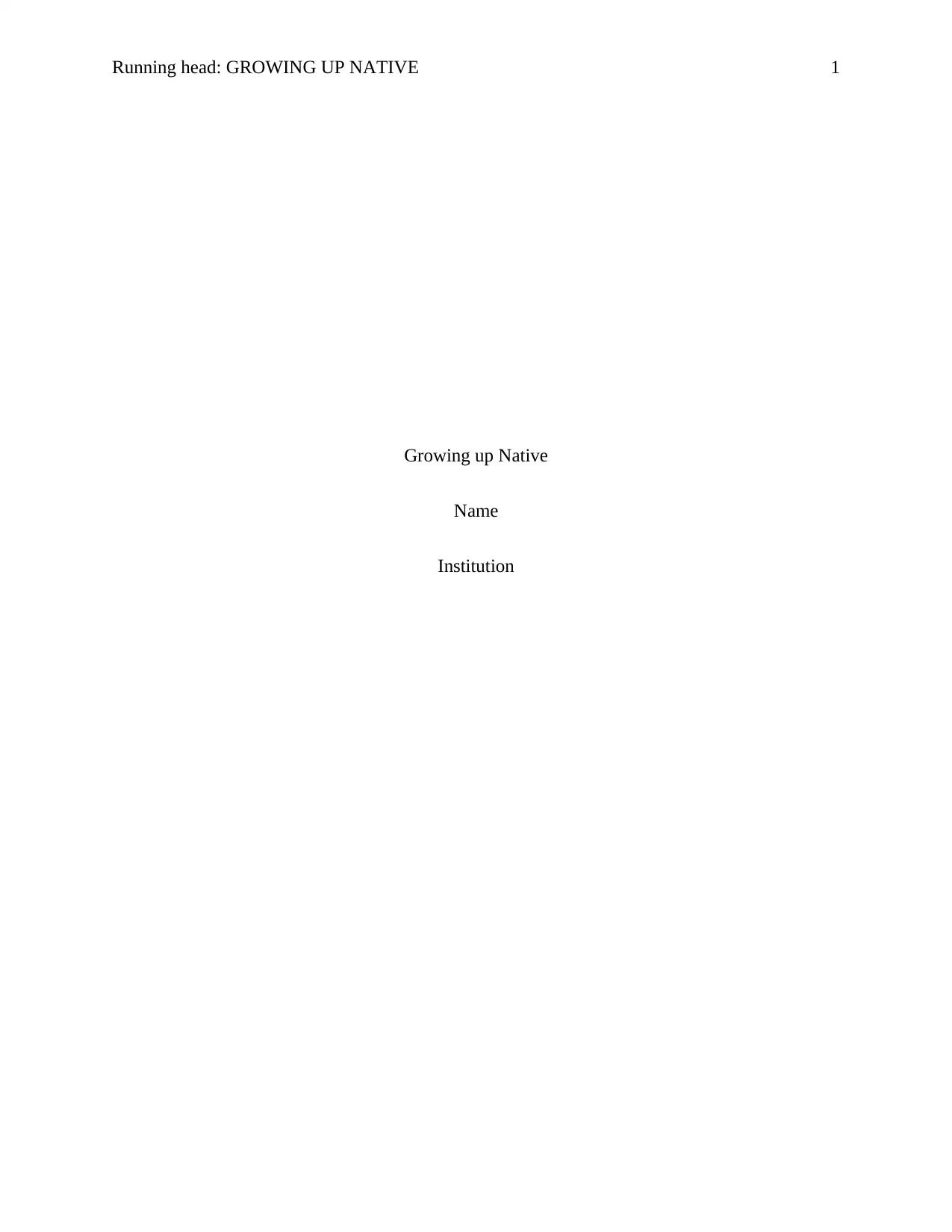
Running head: GROWING UP NATIVE 1
Growing up Native
Name
Institution
Growing up Native
Name
Institution
Paraphrase This Document
Need a fresh take? Get an instant paraphrase of this document with our AI Paraphraser
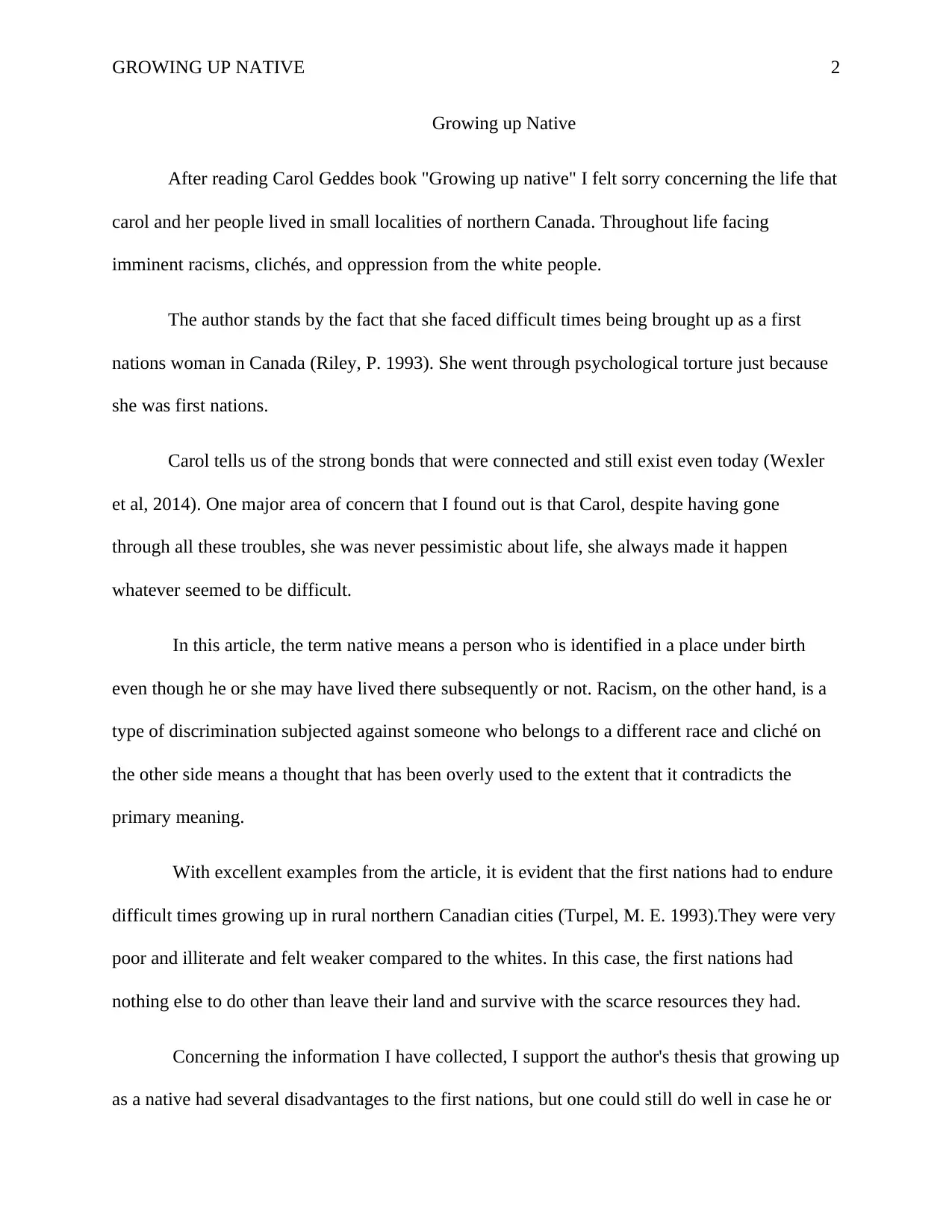
GROWING UP NATIVE 2
Growing up Native
After reading Carol Geddes book "Growing up native" I felt sorry concerning the life that
carol and her people lived in small localities of northern Canada. Throughout life facing
imminent racisms, clichés, and oppression from the white people.
The author stands by the fact that she faced difficult times being brought up as a first
nations woman in Canada (Riley, P. 1993). She went through psychological torture just because
she was first nations.
Carol tells us of the strong bonds that were connected and still exist even today (Wexler
et al, 2014). One major area of concern that I found out is that Carol, despite having gone
through all these troubles, she was never pessimistic about life, she always made it happen
whatever seemed to be difficult.
In this article, the term native means a person who is identified in a place under birth
even though he or she may have lived there subsequently or not. Racism, on the other hand, is a
type of discrimination subjected against someone who belongs to a different race and cliché on
the other side means a thought that has been overly used to the extent that it contradicts the
primary meaning.
With excellent examples from the article, it is evident that the first nations had to endure
difficult times growing up in rural northern Canadian cities (Turpel, M. E. 1993).They were very
poor and illiterate and felt weaker compared to the whites. In this case, the first nations had
nothing else to do other than leave their land and survive with the scarce resources they had.
Concerning the information I have collected, I support the author's thesis that growing up
as a native had several disadvantages to the first nations, but one could still do well in case he or
Growing up Native
After reading Carol Geddes book "Growing up native" I felt sorry concerning the life that
carol and her people lived in small localities of northern Canada. Throughout life facing
imminent racisms, clichés, and oppression from the white people.
The author stands by the fact that she faced difficult times being brought up as a first
nations woman in Canada (Riley, P. 1993). She went through psychological torture just because
she was first nations.
Carol tells us of the strong bonds that were connected and still exist even today (Wexler
et al, 2014). One major area of concern that I found out is that Carol, despite having gone
through all these troubles, she was never pessimistic about life, she always made it happen
whatever seemed to be difficult.
In this article, the term native means a person who is identified in a place under birth
even though he or she may have lived there subsequently or not. Racism, on the other hand, is a
type of discrimination subjected against someone who belongs to a different race and cliché on
the other side means a thought that has been overly used to the extent that it contradicts the
primary meaning.
With excellent examples from the article, it is evident that the first nations had to endure
difficult times growing up in rural northern Canadian cities (Turpel, M. E. 1993).They were very
poor and illiterate and felt weaker compared to the whites. In this case, the first nations had
nothing else to do other than leave their land and survive with the scarce resources they had.
Concerning the information I have collected, I support the author's thesis that growing up
as a native had several disadvantages to the first nations, but one could still do well in case he or
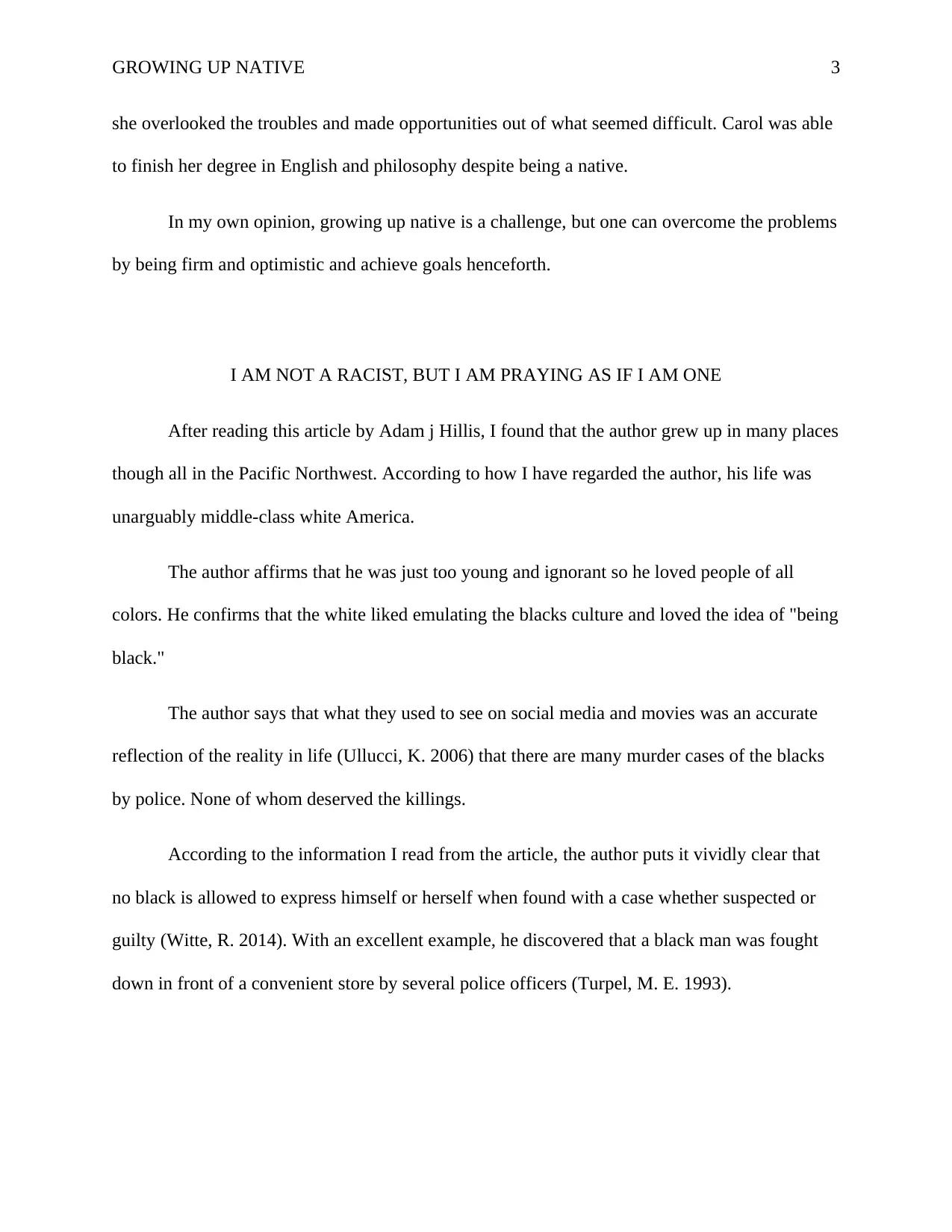
GROWING UP NATIVE 3
she overlooked the troubles and made opportunities out of what seemed difficult. Carol was able
to finish her degree in English and philosophy despite being a native.
In my own opinion, growing up native is a challenge, but one can overcome the problems
by being firm and optimistic and achieve goals henceforth.
I AM NOT A RACIST, BUT I AM PRAYING AS IF I AM ONE
After reading this article by Adam j Hillis, I found that the author grew up in many places
though all in the Pacific Northwest. According to how I have regarded the author, his life was
unarguably middle-class white America.
The author affirms that he was just too young and ignorant so he loved people of all
colors. He confirms that the white liked emulating the blacks culture and loved the idea of "being
black."
The author says that what they used to see on social media and movies was an accurate
reflection of the reality in life (Ullucci, K. 2006) that there are many murder cases of the blacks
by police. None of whom deserved the killings.
According to the information I read from the article, the author puts it vividly clear that
no black is allowed to express himself or herself when found with a case whether suspected or
guilty (Witte, R. 2014). With an excellent example, he discovered that a black man was fought
down in front of a convenient store by several police officers (Turpel, M. E. 1993).
she overlooked the troubles and made opportunities out of what seemed difficult. Carol was able
to finish her degree in English and philosophy despite being a native.
In my own opinion, growing up native is a challenge, but one can overcome the problems
by being firm and optimistic and achieve goals henceforth.
I AM NOT A RACIST, BUT I AM PRAYING AS IF I AM ONE
After reading this article by Adam j Hillis, I found that the author grew up in many places
though all in the Pacific Northwest. According to how I have regarded the author, his life was
unarguably middle-class white America.
The author affirms that he was just too young and ignorant so he loved people of all
colors. He confirms that the white liked emulating the blacks culture and loved the idea of "being
black."
The author says that what they used to see on social media and movies was an accurate
reflection of the reality in life (Ullucci, K. 2006) that there are many murder cases of the blacks
by police. None of whom deserved the killings.
According to the information I read from the article, the author puts it vividly clear that
no black is allowed to express himself or herself when found with a case whether suspected or
guilty (Witte, R. 2014). With an excellent example, he discovered that a black man was fought
down in front of a convenient store by several police officers (Turpel, M. E. 1993).
⊘ This is a preview!⊘
Do you want full access?
Subscribe today to unlock all pages.

Trusted by 1+ million students worldwide
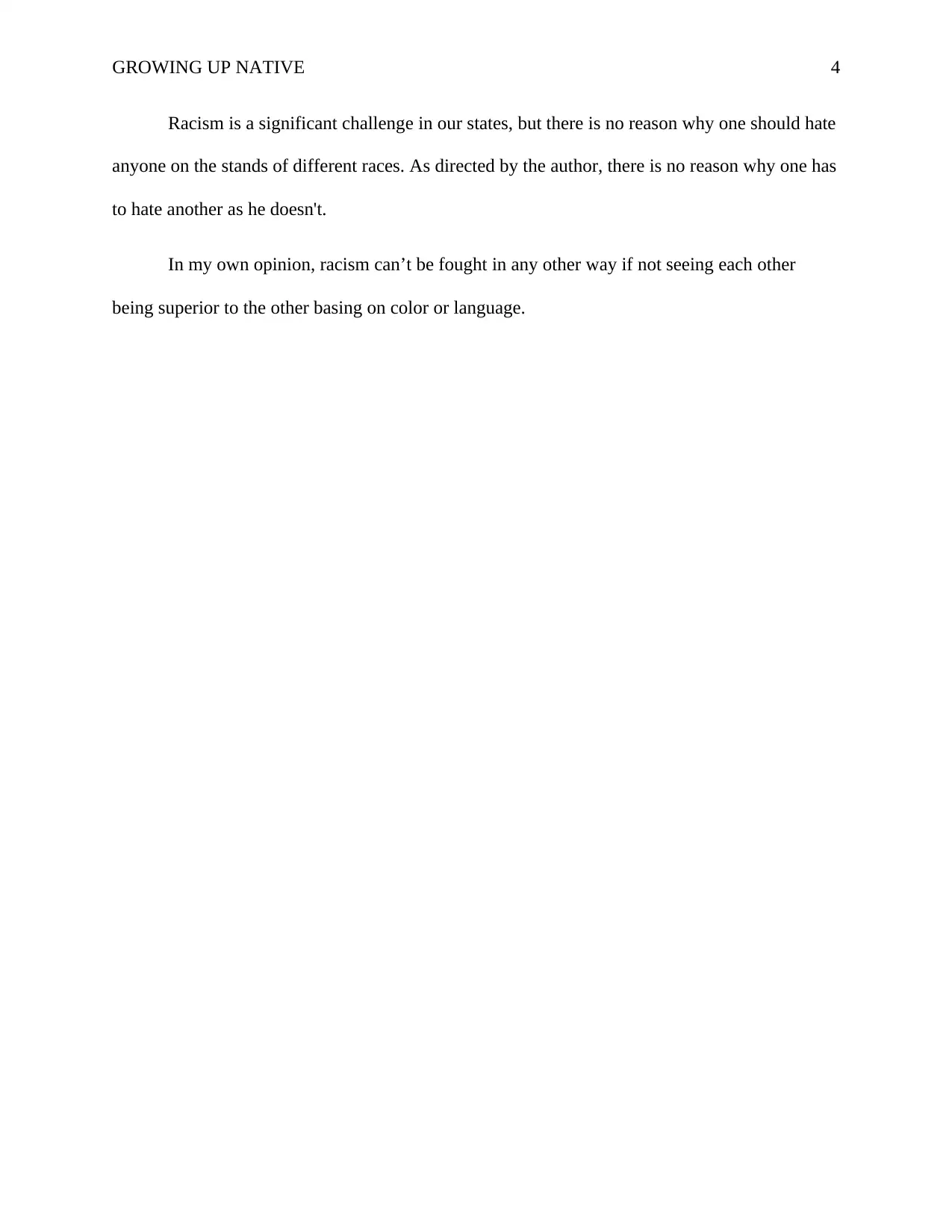
GROWING UP NATIVE 4
Racism is a significant challenge in our states, but there is no reason why one should hate
anyone on the stands of different races. As directed by the author, there is no reason why one has
to hate another as he doesn't.
In my own opinion, racism can’t be fought in any other way if not seeing each other
being superior to the other basing on color or language.
Racism is a significant challenge in our states, but there is no reason why one should hate
anyone on the stands of different races. As directed by the author, there is no reason why one has
to hate another as he doesn't.
In my own opinion, racism can’t be fought in any other way if not seeing each other
being superior to the other basing on color or language.
Paraphrase This Document
Need a fresh take? Get an instant paraphrase of this document with our AI Paraphraser
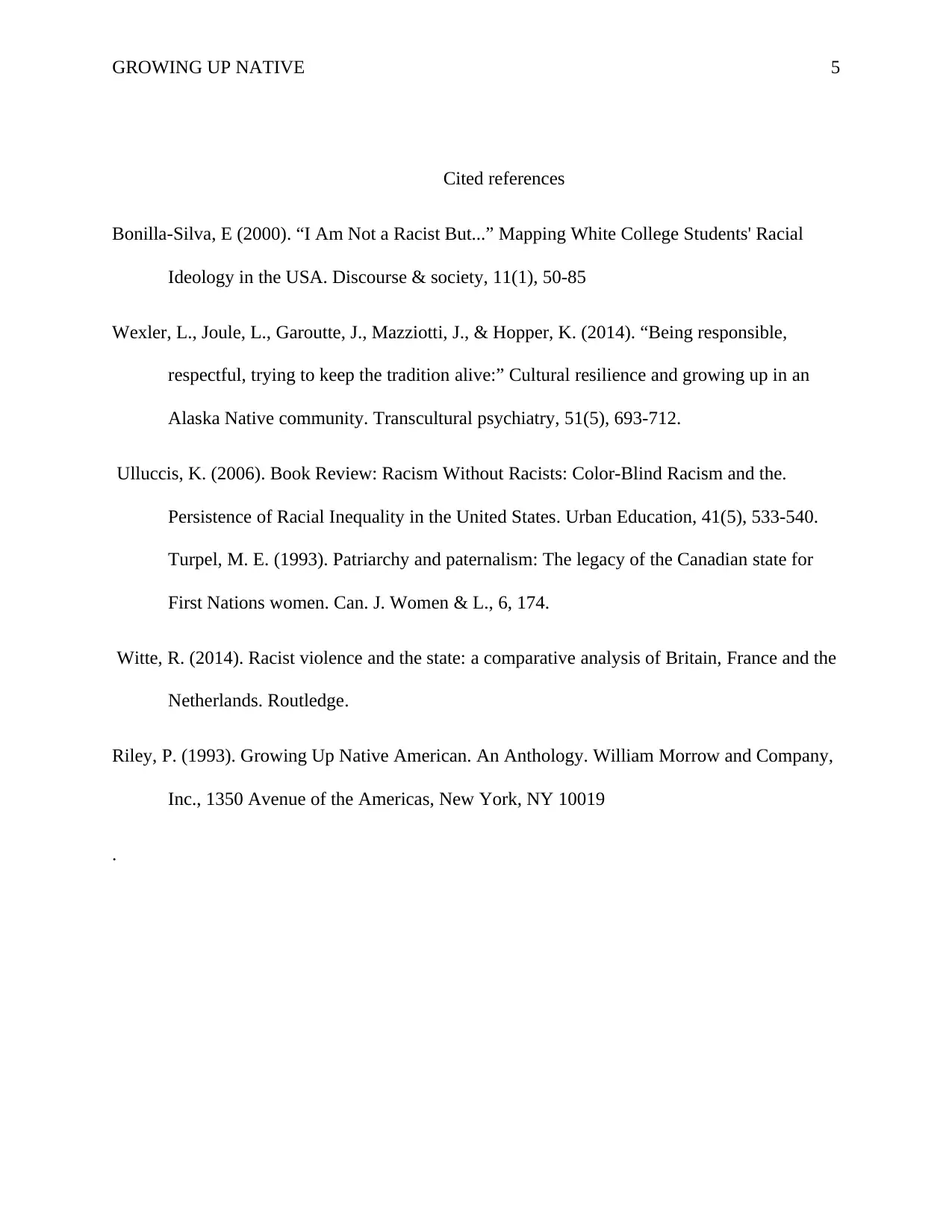
GROWING UP NATIVE 5
Cited references
Bonilla-Silva, E (2000). “I Am Not a Racist But...” Mapping White College Students' Racial
Ideology in the USA. Discourse & society, 11(1), 50-85
Wexler, L., Joule, L., Garoutte, J., Mazziotti, J., & Hopper, K. (2014). “Being responsible,
respectful, trying to keep the tradition alive:” Cultural resilience and growing up in an
Alaska Native community. Transcultural psychiatry, 51(5), 693-712.
Ulluccis, K. (2006). Book Review: Racism Without Racists: Color-Blind Racism and the.
Persistence of Racial Inequality in the United States. Urban Education, 41(5), 533-540.
Turpel, M. E. (1993). Patriarchy and paternalism: The legacy of the Canadian state for
First Nations women. Can. J. Women & L., 6, 174.
Witte, R. (2014). Racist violence and the state: a comparative analysis of Britain, France and the
Netherlands. Routledge.
Riley, P. (1993). Growing Up Native American. An Anthology. William Morrow and Company,
Inc., 1350 Avenue of the Americas, New York, NY 10019
.
Cited references
Bonilla-Silva, E (2000). “I Am Not a Racist But...” Mapping White College Students' Racial
Ideology in the USA. Discourse & society, 11(1), 50-85
Wexler, L., Joule, L., Garoutte, J., Mazziotti, J., & Hopper, K. (2014). “Being responsible,
respectful, trying to keep the tradition alive:” Cultural resilience and growing up in an
Alaska Native community. Transcultural psychiatry, 51(5), 693-712.
Ulluccis, K. (2006). Book Review: Racism Without Racists: Color-Blind Racism and the.
Persistence of Racial Inequality in the United States. Urban Education, 41(5), 533-540.
Turpel, M. E. (1993). Patriarchy and paternalism: The legacy of the Canadian state for
First Nations women. Can. J. Women & L., 6, 174.
Witte, R. (2014). Racist violence and the state: a comparative analysis of Britain, France and the
Netherlands. Routledge.
Riley, P. (1993). Growing Up Native American. An Anthology. William Morrow and Company,
Inc., 1350 Avenue of the Americas, New York, NY 10019
.

GROWING UP NATIVE 6
⊘ This is a preview!⊘
Do you want full access?
Subscribe today to unlock all pages.

Trusted by 1+ million students worldwide

GROWING UP NATIVE 7
1 out of 7
Related Documents
Your All-in-One AI-Powered Toolkit for Academic Success.
+13062052269
info@desklib.com
Available 24*7 on WhatsApp / Email
![[object Object]](/_next/static/media/star-bottom.7253800d.svg)
Unlock your academic potential
Copyright © 2020–2025 A2Z Services. All Rights Reserved. Developed and managed by ZUCOL.





